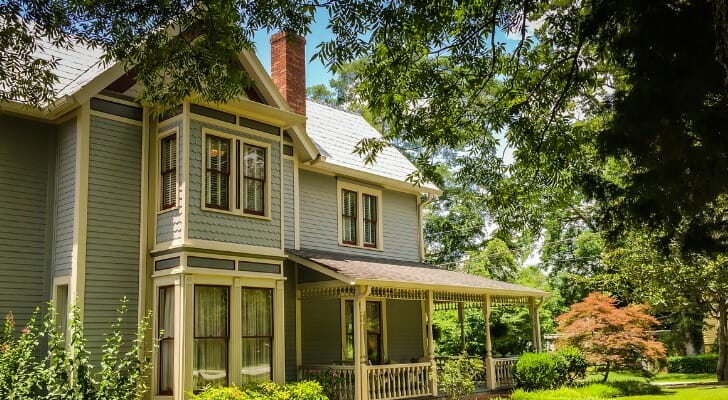
No matter where you hope to settle in Georgia, housing costs usually will be relatively affordable compared to many other states. Buying your first home can still be intimidating, of course. Georgia’s Department of Community Affairs and the federal government have created first-time homebuyer programs to help, though. Between sponsored mortgages and down payment assistance, you could save thousands. Since the options can be overwhelming, consider using the SmartAsset financial advisor matching tool to access Georgia-specific financial professionals at your own pace.
Federal First-Time Homebuyer Programs
There are a number of first-time homebuyer programs available to you that are supported by the federal government. These programs help you get access to better interest rates, lower eligibility requirements or down payment assistance. Here are the most popular first-time homebuyer programs backed by the federal government to help those looking for a mortgage.
FHA Loans
| Pros | – Low down payment requirements – Low credit scores accepted |
| Cons | – Higher down payments are needed for those with a low credit score |
| Eligibility | – Credit score of at least 500 – Must have a 3.5% down payment – Debt to income ratio <43% |
| Best For | – Anyone that doesn’t have a perfect credit history or sufficient funds for a down payment |
The Federal Housing Administration backs FHA loans. A great option for anyone who lacks adequate savings, FHA loans generally require a 3.5% down payment. Consider that standard mortgages require 20% down and you’ll realize what a substantial benefit that is.
To receive this perk in its full glory, you must have a FICO® credit score of 580. If your credit score is closer to 500, you could need to make a down payment of up to 10% of your home’s value. Still not too shabby compared to 20%. In fact, even with the credit score requirement, an FHA loan is one of the easiest federal programs to qualify for.
VA Loans
| Pros | – Loan coverage up to 100% of your home’s value – No private mortgage insurance requirement – Usually comes with lower closing costs |
| Cons | – Must pay VA fee – Long application process |
| Eligibility | – Current or former military members, spouses, or other beneficiaries – Credit score of at least 620 |
| Best For | – Veterans with little monthly income or savings |
The Department of Veterans Affairs insures VA loans, which help veterans without adequate savings or significant income. Depending on your circumstances, a VA loan may not require any down payment at all. Plus, since the government will back part of your risk, you won’t have to get private mortgage insurance (PMI).
While significant, those aren’t the only benefits. VA loans also tend to come with lower closing costs than other mortgages. To qualify for a VA loan, veterans usually need a FICO® credit score of at least 620. You also need to pay between 1.25% to 2.4% of your home’s value into the VA fund. The exact amount will depend on how much you put down upfront if you choose to make a down payment at all.
USDA Loans
| Pros | – No down payment requirement for those with decent credit scores – Low credit scores accepted |
| Cons | – Only available to those that don’t qualify for a conventional mortgage |
| Eligibility | – Cannot earn more than 115% of the adjusted U.S. median in most cases – Home must be in an eligible rural area |
| Best For | – Low- to mid-income individuals willing to live in the country |
The United States Department of Agriculture (USDA) sponsors the “Section 502 Single Family Housing Guaranteed Loan Program,” better known as USDA mortgages. USDA mortgages attract new homebuyers to less populous areas of the country, whether they be rural or semi-rural.
Borrowers must earn less than 115% of the U.S. median income and prove that they are unable to secure a conventional mortgage in order to secure a USDA loan. Depending on your FICO® credit score, you might not have to pay any down payment at all. If your score falls a bit lower on the scale, you may have to pay a down payment of around 10% of your home’s value.
Good Neighbor Next Door Program
| Pros | – 50% discount off home list price |
| Cons | – Only available in select areas – Only available to certain professionals |
| Eligibility | – Police officers, firefighters, emergency medical technicians or pre-K through grade 12 teachers – Home must be your primary residence for at least three years |
| Best For | – Public servants without adequate savings for a home |
More of a discount than a loan, the Good Neighbor Next Door Program rewards emergency personnel and teachers with a 50% reduction on their home’s price. If you use the Good Neighbor Next Door Program, you can finance the remaining cost of your home with a conventional, VA or FHA mortgage, or pay cash.
To qualify, your home must be located within what the Department of Housing and Urban Development (HUD) designates as a “revitalization area.” Perhaps most importantly, you must stay in the home for at least three years after the purchase. On the bright side, so long as you stick around, you can sell the home and hold onto any profit and equity once the three years are up.
Fannie Mae/Freddie Mac
| Pros | – Low down payment requirement – Multiple loan styles available – No credit necessary for certain loans |
| Cons | – Higher interest rates than other federal programs |
| Eligibility | – Cannot earn more than location-specific income requirements unless you’re buying a home in a low-income census tract. |
| Best For | – Anyone looking for a low down payment loan but doesn’t qualify for any other federal options |
Freddie Mac and Fannie Mae government-sponsored mortgage providers offer a few different loans for first-time homebuyers.
The HomeReady® loan from Fannie Mae, for one, requires down payments as low as 3%. That makes it a great choice for anyone who’s strapped for cash, has a credit score of at least 620 and makes an income at or near the U.S. median. With a HomeReady® loan, you must have private mortgage insurance at the time of purchase. Once you’ve accrued 20% equity in your new home, you can cancel it.
One of the more popular Freddie Mac mortgages is the 97% LTV Home Possible loan. LTV stands for loan-to-value, meaning down payments are 3% here.
You don’t need a strong credit history to qualify for a Home Possible loan and you can choose both the length and terms of the loan. It also has that cancelable private mortgage insurance we talked about above. Perhaps best of all, you won’t need a strong (or any) credit history to qualify. The Home Possible Advantage mortgage is essentially the same, except it has credit requirements and only comes in fixed-rate variations.
NADL
| Pros | – No down payment requirement – Low credit scores accepted – No private mortgage insurance requirement – Usually comes with lower closing costs |
| Cons | – Only available in select areas |
| Eligibility | – Current or former military members of Native American descent, their spouses, or other beneficiaries – Home must be located in an eligible territory |
| Best For | – Native American veterans with limited income or savings |
Native American Direct Loans (NADL) is another mortgage option from the Department of Veteran Affairs. They come with impressive perks, like a 0% down payment and a set interest rate. The interest rate currently sits at 4.5%, though that is subject to change based on market and Prime Rate fluctuations.
Veterans won’t even need an impressive credit record or private mortgage insurance to qualify. In an effort to cut down on the extra expense that closing costs can create, the VA has significantly lowered those as well. Keep in mind that the home must be located on allotted lands, Alaska Native corporations, Pacific Island territories or federally-recognized trusts.
Georgia First-Time Homebuyer Programs
The first-time homebuyer programs backed by the state of Georgia offer downpayment assistance and low, or zero, interest rates on your home mortgage. These programs can be more difficult to qualify for than federal loan programs but they are only applicable to residents of the state of Georgia looking to buy a house to live in.
Georgia Dream Home Ownership Program

| Pros | – Low-interest rates – Quick closing process – Potential to combine with down payment assistance |
| Cons | – Strict eligibility requirements |
| Eligibility | – Credit score of at least 640 – Liquid assets lower than 20% of the home’s price – Must complete homebuyer education – Income and purchase price limits dependent on home location and household size |
| Best For | – Low- and mid-income Georgians with decent credit scores but limited savings |
The Georgia Department of Community Affairs (DCA) Georgia Dream program offers affordable mortgage financing to first-time homebuyers (defined as homebuyers that have not owned all or part of their primary residence in the past three years). Borrowers apply with one in a state-approved network of lenders. Loans are secured or guaranteed by the FHA, VA, USDA or conventional loan sources.
To qualify, borrowers need a FICO® score of 640. In addition, you cannot own liquid assets worth more 20% of their home’s price (or $200,000, whichever is greater). This rule applies to all Georgia Dream down payment assistance programs including the ones we examine below.
In order to be eligible for any of these programs, you also have to meet income requirements based on location. Each program also sets credit score requirements, but you generally need one of at least 640.
For the standard program, your income cannot exceed state-designated limits. Those are currently between $60,500 and $84,000, depending on your household size and home location. The home’s purchase price must be less than $250,000 in the Atlanta metro area and less than $200,000 everywhere else in the state.
You will also need to complete a homebuyer education course with a HUD-Approved or DCA-Certified Housing Counseling Agency. There are in-person and online options, so it isn’t too difficult to find a class. As exhaustive as this might sound, the course teaches valuable lessons about homeownership. These include the Ready, Set, Go homebuyer program, which helps potential borrowers improve their credit scores.
Georgia Dream Standard Down Payment Assistance
| Pros | – Zero-interest loan – Deferred repayment |
| Cons | – Must be repaid in full |
| Eligibility | – Must have a 30-year fixed rate conventional mortgage, FHA, VA or USDA loan – Must contribute at least $1,000 for down payment assistance |
| Best For | – Georgia Dream participants that need more help to cover their down payment or closing costs |
All Georgia Dream borrowers are eligible for a no-interest loan of up to $5,000 to use toward a down payment and closing costs. Perhaps best of all, you only have to repay the assistance amount once you sell, refinance or no longer utilize your home as a primary residence.
Eligibility mirrors that of the Georgia Dream Home Ownership Program. As with Georgia Dream loans, borrowers must complete a homebuyer education course with a HUD-Approved or DCA-Certified Housing Counseling Agency, either online or in-person, before receiving the benefit. The only additional requirement is that homebuyers contribute at least $1,000 of their own funds toward the home purchase. Gifts are allowed.
Georgia Dream PEN Down Payment Assistance
| Pros | – Up to $7,500 to use toward the upfront costs of homeownership – Deferred repayment |
| Cons | – Must be repaid |
| Eligibility | – Georgia Dream loan participant – Employee in protection, military, health care or education fields – Must contribute at least $1,000 toward the purchase – Must have a 30-year fixed rate conventional mortgage, FHA, VA or USDA loan |
| Best For | – Public servants, teachers, military service members, and healthcare providers participating in the Georgia Dream Homeownership Program |
Employees of the police, highway patrol, correctional, fire, and EMS departments; employees of any state-recognized private or public schools; active military service members and employees of state-licensed health facilities can save even more with the PEN Down Payment Assistance program. If you’re eligible, you’ll receive up to $7,500 toward a down payment and closing costs.
It works much the same way as Georgia Dream Standard Down Payment Assistance. It carries no interest and requires no repayments until you sell, refinance or no longer consider the home your primary residence. As with all Georgia Dream loans, you must complete a homebuyer education course.
Georgia Dream Choice Down Payment Assistance
| Pros | – Up to $7,500 to use toward the upfront costs of homeownership – Zero interest – Deferred repayment |
| Cons | – Must be repaid |
| Eligibility | – Georgia Dream loan participant – Household must include an individual living with a disability – Must contribute at least $1,000 toward the purchase – Must have a 30-year fixed rate conventional mortgage, FHA, VA or USDA loan |
| Best For | – Disabled individuals or family members of disabled individuals participating in the Georgia Dream Homeownership Program |
Choice Down Payment Assistance is run similarly to other Georgia Dream down payment assistance programs. It’s designed specifically for those with a disability or anyone with a disabled family member living with them. You must also complete a homebuyer education course.
As with the PEN Down Payment Assistance program, eligible Georgia Dream borrowers receive up to $7,500 toward down payment and closing costs. There’s no interest and you don’t have to make any payments until the home is no longer your primary residence or you sell or refinance.
Georgia Dream Hardest Hit Fund Down Payment Assistance
| Pros | – Up to $15,000 to use toward the upfront costs of homeownership – Zero interest – Deferred repayment – Forgivable after five years |
| Cons | – Only available in select areas |
| Eligibility | – Georgia Dream loan participant – Minimum credit score of 640 – Home must be existing properties in eligible counties – Must have a 30-year fixed rate conventional mortgage, FHA, VA or USDA loan |
| Best For | – Georgia Dream participants buying previously owned homes in counties hit hardest by the 2008 crisis |
The U.S. Treasury provided $15 million to help the Georgia Housing and Finance Authority establish the Georgia Dream Hardest Hit Fund (HHF). This works to stabilize communities hit especially hard with delinquency, negative equity and foreclosures. In turn, the HHF Down Payment Assistance Program provides up to $15,000 to eligible borrowers using a Georgia Dream mortgage to purchase an existing home in select counties.
Homes in Fulton, DeKalb, Paulding, Clayton, Muscogee, Douglas, Gwinnett, Chatham, Henry and Bibb counties are included in the current HHF program. Funds are awarded in the form of a second, no-interest loan. Like other Georgia Dream loans, there are no monthly payments so long as you stay in the home and keep current on your primary mortgage. Best of all, the loan is forgiven five years after the closing date.
The Bottom Line

Your dream of owning a home in Georgia can be made a reality through a first-time homebuyer program offered either through the state of Georgia or the federal government. Each program offers specific benefits such as lower interest rates, easier qualification requirements or assistance with your down payment. You may be able to mix and match some programs to maximize what benefits are available to you.
Tips for Your Home Loan Search
- If you need help maintaining a balance between every aspect of your financial life, consider seeking help from a local expert. SmartAsset’s free tool matches you with up to three financial advisors who serve your area, and you can interview your advisor matches at no cost to decide which one is right for you. If you’re ready to find an advisor who can help you achieve your financial goals, get started now.
- It’s best to figure out how much house you can afford before you start your search. Once you do this, investigate the lenders, interest rates and down payment requirements for each option before you choose.
Photo credit: ©iStock.com/AGrigorjeva, ©iStock.com/valentinrussanov, ©iStock.com/Bob-Steiner